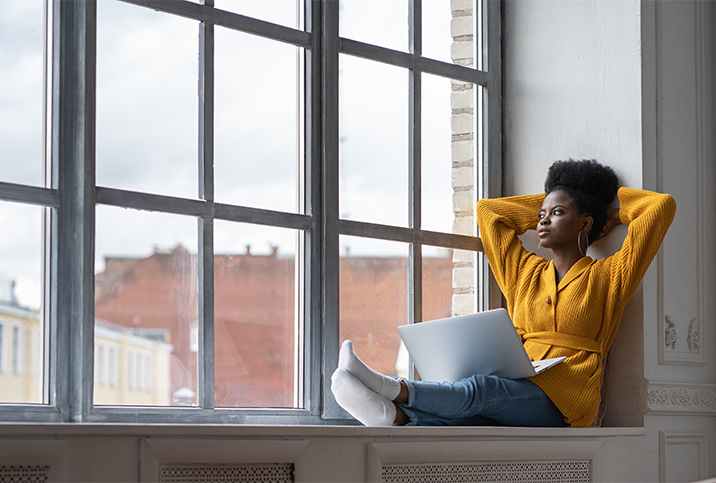As COVID-19 Approaches Endemic Status, a Look at Virtual Repercussions

Two years into a global pandemic, we now face a new prospect: that COVID-19 will become endemic, meaning we'll have to live with it for the foreseeable future. Given how things have been going since 2020, how are we handling that possibility? Are we generally well-prepared—as a society and from a psychological and emotional standpoint—to move beyond the pandemic state?
Lawrence A. Siegel, M.A., is an AASECT-certified sexuality educator, consultant and therapist in Boynton Beach, Florida, who works with couples and individuals to address issues relating to intimacy, communication and sexuality. He said COVID-19 becoming endemic will represent a departure from survival-first thinking.
"Our mindset is going to shift," Siegel said. "It's not going to be such a new virus anymore, we're not going to be in panic mode anymore. We will acknowledge it, deal with it, do the best we can—just kind of like we've done with flu and pneumonia. People are starting to get into these new modes when it comes to sex and relationships but I think we're kind of all over the place."
Endemic COVID-19 and emerging intimacy issues
People who entered into the pandemic single had a very different experience from those who have spent it partnered. There are similarities and consistent themes across the board, but the dynamic exchanges between people have generally been diminished in volume and/or richness of experience.
"[Daters] just have not been making human connections. Regardless of their age, there's been a lot more online connections—dating apps have blown up in the last two years," Siegel said. He described dating as, initially, more of an auditing process than anything else in the contemporary milieu.
The past two years have fast-tracked changes in human intimacy. Between lockdowns and polarizing politics, it's no wonder people have become more dependent on algorithms to meet new people. In addition, with 6 feet of personal space accounting for personal safety for so long now, video chats have become a customary first-date practice.
There's nothing wrong with these accommodations, and they may certainly have provided a lifeboat for some after many social channels were destroyed. As the reality of endemic COVID-19 becomes more and more imminent, however, these technologies are less like lifeboats and more like conveniences designed to facilitate our desires for intimacy with one another.
Between lockdowns and polarizing politics, it's no wonder people have become more dependent on algorithms to meet new people.
Siegel described these conveniences as being a long time coming, possibly with or without the pandemic to speed it along.
The current trend is to plan to "have a date or two virtually, see if we have enough to actually want to take the risk and meet in person," he said. "And I think that's going to continue. In some ways, it brings us closer to what I think the technology is made for: a screening tool versus Home Shopping Network."
The good thing is that some difficult conversations are becoming more normalized as part of the screening process embedded into online dating.
"Talking about things, not just like physical health, but mental health conversations are now part of how people are looking to connect," Siegel noted, adding that modern daters often want to hear potential partners show interest in mental health issues, "especially if they themselves are in treatment."
"The vast majority of people are still very reticent to talk about their own experiences in treatment and therapy," he continued. "So, that's going to be an interesting dynamic, especially that it's now being held out as a standard for a potential partner."
Post-pandemic depersonalization
"I think there are concerning patterns forming here, and especially for younger people," Siegel said. "There is an age thing that we have to look at. And if we look at the younger-skewing part of the population, I think that is a problem that is continuing to get worse."
What Siegel means by the "age thing" is that people who have grown up with technology attached to their social experience have already redefined connection for themselves and for societal mechanics as a whole. "It's sort of non-human—it's not that personal thing."
"We've already experienced, even pre-pandemic, depersonalization in how people form relationships," Siegel continued. "I think a lot of those people are going to have some dashed expectations. Their approach to connecting with another human being is not empathy-based, it is self-serving."
Siegel specifically means people who have only really learned to form new relationships through a third party, such as social media or dating apps. He noted people who seek a long-term, satisfying relationship by checking off items in a list of traits they approve of are not likely to find what they are really looking for.
Just because technology and commercialism have complicated human connections doesn't mean that people aren't still bonding and exploring in unique and substantial ways. Siegel said those connections have spread to regional and even national communities as we've continued to cope with ongoing crises.
"There are a number of people that actually created even greater bonds through all of this," Siegel said. "They basically sort of circled their wagons together and said, 'Hey, we're going to get through this together,' and used it as an opportunity to increase communication, to increase our understanding of each other.'"
Global communities are still learning to cope with the mental health and lifestyle aspects of COVID-19. As the virus evolves into an endemic, we can only hope communities will continue to build upon the positive efforts made in recent years.
Clinical convenience and community cultivation
Just as remote social technologies have been a boon to solving our social dilemmas during the pandemic, they've proven incredibly helpful when it comes to providing counseling and other clinical consultation with regard to mental and behavioral health services.
Ashley, a therapist in New Orleans, works primarily with adults but occasionally with teens sixteen and older.
"Before the pandemic, I wasn't doing any virtual therapy appointments," she said. "Then, pretty quickly, we got on a platform that was HIPAA compliant that allowed us to be able to keep seeing people. It was slow in the initial weeks of lockdown, but once we got onto virtual appointments, it just kind of went full-speed from there."
Remote appointments offer a lot of convenience beyond dealing with a pandemic.
"Sometimes I'll have an agreement to have an in-person appointment with someone, and then that person gets really overwhelmed or really busy and they will be like, 'Can we just do a video call, instead?' That option wasn't there before," she continued.
"But, there's a bad side to that, as well. Sometimes I think it can enable people to not push themselves to get out of the house when maybe it would be a good idea for them to, so it really kind of depends on each individual circumstance."
Anecdotally, Ashley said she's "definitely seeing social anxiety worsening. People who maybe had a bit of social anxiety to begin with at baseline are rating much higher now."
The outlook is unclear
"People are definitely in some ways gaining more access to things because they don't necessarily have to leave their house," Ashley said. "So, especially for people with disabilities, I think that [the pandemic has been] a double-edged sword. Because on one hand you have people not really following guidelines for preventing the spread of COVID-19 and that makes it really scary for people with disabilities and immunocompromised people. But on the other hand, because this has kind of ushered in so many virtual appointments and meetings and things like that, there are more opportunities in that way."
With so many options on the table, making the most advantageous choice can feel daunting.
"For a lot of people with social anxiety, they'll cope with avoidance," Ashley added. "What I try to tell people is that as scary and uncomfortable as it is, you reinforce that fear by constantly avoiding everything."
Ashley points people who are not comfortable with in-person experiences toward remote opportunities through platforms like Meetup and other resources. But, of course, we know resources and services are not available equally in each community or household.
So, how will American mental health fare as COVID-19 becomes an endemic disease in the world? It's really impossible to say, but it looks more likely than not that virtual communication will continue to play a significant role.



















